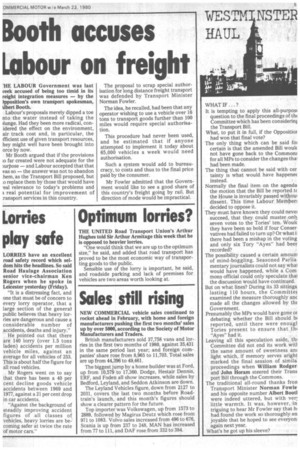Booth accuses Labour on freight
Page 7

If you've noticed an error in this article please click here to report it so we can fix it.
'HE LABOUR Government was last' veek accused of being too timid in its reight integration measures — by the )pposition's own tranSport spokesman, Ubert Booth.
Labour's proposals merely dipped a toe nto the water instead of taking the plunge. Had they been more radical, conidered the effect on the environment, air track cost and, in particular, the ,fficient use of given transport resources, hey might well have been brought into orce by now.
Mr Booth argued that if the provisions ;o far created were not adequate for the mrpose — and Labour accepted that that vas so — the answer was not to abandon hem, as the Transport Bill proposed, but .0 replace them by those that would have 'eel relevance to today's problems and real potential for improvement of ransport services in this country. The proposal to scrap special authorisation for long distance freight transport was defended by Transport Minister Norman Fowler.
The idea, he recalled, had been that any operator wishing to use a vehicle over 16 tons to transport goods further than 100 miles would require special authorisation.
This procedure had never been used, and he estimated that if anyone attempted to implement it today about 65,000 vehicles a week would need authorisation.
Such a system would add to bureaucracy, to costs and thus to the final price paid by the consumer.
Mr Fowler admitted that the Government would like to see a good share of this country's freight going by rail. But direction of mode would be impractical.
































































































































